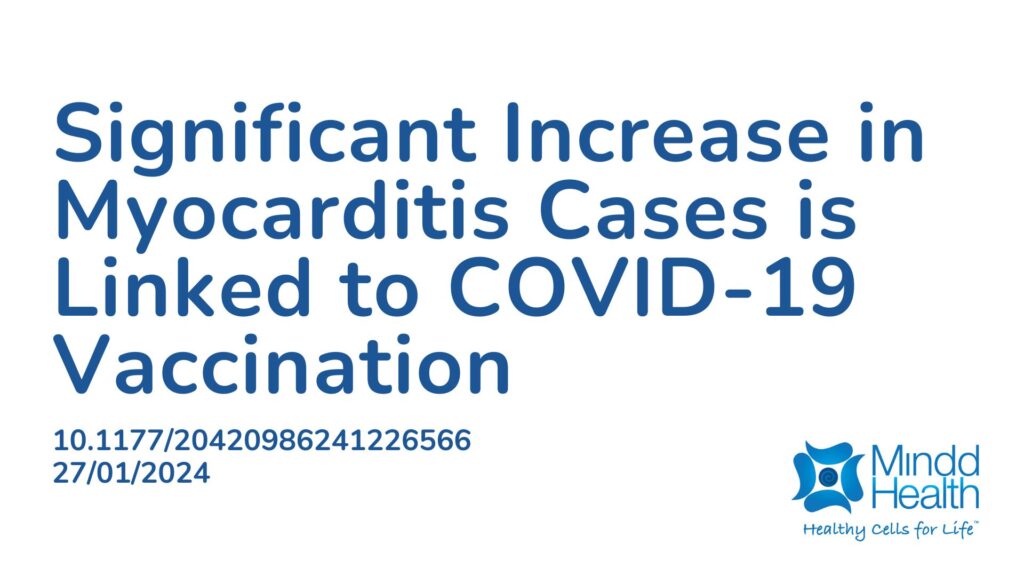Summary:
Myocarditis refers to inflammation of the myocardium, the muscular tissue of the heart. The myocardium is responsible for heart contractions and contains many important cardiac cells, which are vulnerable to inflammation-related damage. Myocarditis can present as chest pain, heart failure, or sudden death, and it is a significant cause of cardiac death among young individuals. Those most at risk for myocarditis are between puberty and their early 30s, with the condition being the third leading cause of sudden cardiac death in children and young adults. Before the COVID-19 pandemic, myocarditis affected approximately 4 per million children annually. Vaccines, such as those for influenza and smallpox, have previously been associated with myocarditis. Cases of myocarditis have also been reported following SARS-CoV-2 infection, even before the introduction of COVID-19 vaccines. Symptoms of myocarditis after a COVID-19 vaccination include chest pain, palpitations, and exercise intolerance. The Vaccine Adverse Event Reporting System (VAERS) was established by the FDA and CDC in 1990 to serve as a warning system for potential vaccine-related adverse events not detected during pre-market testing. The National Childhood Vaccine Injury Act of 1986 mandates that healthcare providers and vaccine manufacturers report specific adverse events following vaccination to the Department of Health and Human Services. However, under-reporting remains a significant limitation of the system. Myocarditis has been classified as a serious adverse event due to its association with hospitalization and sudden death. Although regulatory agencies continue to monitor the rollout of COVID-19 vaccines, not all potential risks are fully understood. The Israeli Ministry of Health recently reported that approximately 1 in 4,500 men aged 16-24 who received the Pfizer-BioNTech vaccine developed myocarditis. Prospective cohort studies found myocarditis rates of 2.3%-2.8% after the second and third vaccine doses. Given these concerns, this review aimed to analyze VAERS data to investigate the potential link between COVID-19 vaccines and myocarditis. The analysis showed that the number of myocarditis reports in VAERS following COVID-19 vaccination in 2021 was 223 times higher than the average for all vaccines combined over the past 30 years. This represented a 2500% increase in the number of reports during the first year of the vaccination campaign compared to data before 2021. Further analysis showed that myocarditis cases were most common among youth and males. A total of 76% of cases required emergency care and hospitalization, and 92 individuals (3%) died from myocarditis. The condition was more likely to occur after the second dose, and individuals under 30 were significantly more likely than those over 30 to develop myocarditis. The authors concluded that COVID-19 vaccination is strongly associated with a serious safety concern for myocarditis, particularly in children and young adults. Further research into the mechanisms of COVID-19 vaccine-induced myocarditis is critical to developing effective mitigation strategies and ensuring the safety of vaccination programs.
Abstract:
Background: Following the roll-out of the Pfizer-BioNTech BNT162b2, Moderna mRNA-1273, and Janssen Ad26.COV2.S coronavirus disease 2019 (COVID-19) injections in the United States, millions of individuals have reported adverse events (AEs) using the vaccine adverse events reports system (VAERS). The objective of this analysis is to describe the myocarditis data in VAERS and the COVID-19 vaccines as potential determinants of myocarditis. Methods: We used VAERS data to examine the frequency of reporting myocarditis since the beginning of the mass vaccination campaign and compared this with historical values in VAERS and COVID-19 vaccine administration data from the Our World in Data database. We examined myocarditis reports in VAERS in the context of sex, age, and dose. Statistical analysis was done using the Student’s t-test to determine statistically significant differences between ages among myocarditis adverse events (AEs) and the chi-square test to determine relationships between categorical variables with statistical significance. Results: We found the number of myocarditis reports in VAERS after COVID-19 vaccination in 2021 was 223 times higher than the average of all vaccines combined for the past 30 years. This represented a 2500% increase in the absolute number of reports in the first year of the campaign when comparing historical values prior to 2021. Demographic data revealed that myocarditis occurred most in youths (50%) and males (69%). A total of 76% of cases resulted in emergency care and hospitalization. Of the total myocarditis reports, 92 individuals died (3%). Myocarditis was more likely after dose 2 (p < 0.00001) and individuals less than 30 years of age were more likely than individuals older than 30 to acquire myocarditis (p < 0.00001). Conclusion: COVID-19 vaccination is strongly associated with a serious adverse safety signal of myocarditis, particularly in children and young adults resulting in hospitalization and death. Further investigation into the underlying mechanisms of COVID-19 vaccine-induced myocarditis is imperative to create effective mitigation strategies and ensure the safety of COVID-19 vaccination programs across populations.
Article Publication Date: 27/01/2024
DOI: 10.1177/20420986241226566



